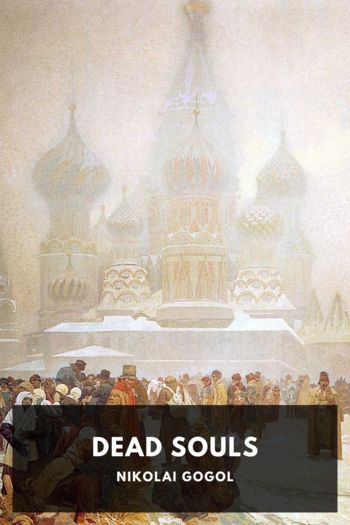Dead Souls - Nikolai Gogol (most life changing books .txt) 📗

- Author: Nikolai Gogol
Book online «Dead Souls - Nikolai Gogol (most life changing books .txt) 📗». Author Nikolai Gogol
But here let me remark that I do not like engaging the reader’s attention in connection with persons of a lower class than himself; for experience has taught me that we do not willingly familiarise ourselves with the lower orders—that it is the custom of the average Russian to yearn exclusively for information concerning persons on the higher rungs of the social ladder. In fact, even a bowing acquaintance with a prince or a lord counts, in his eyes, for more than do the most intimate of relations with ordinary folk. For the same reason the author feels apprehensive on his hero’s account, seeing that he has made that hero a mere Collegiate Councillor—a mere person with whom Aulic Councillors might consort, but upon whom persons of the grade of full General8 would probably bestow one of those glances proper to a man who is cringing at their august feet. Worse still, such persons of the grade of General are likely to treat Chichikov with studied negligence—and to an author studied negligence spells death.
However, in spite of the distressfulness of the foregoing possibilities, it is time that I returned to my hero. After issuing, overnight, the necessary orders, he awoke early, washed himself, rubbed himself from head to foot with a wet sponge (a performance executed only on Sundays—and the day in question happened to be a Sunday), shaved his face with such care that his cheeks issued of absolutely satin-like smoothness and polish, donned first his bilberry-coloured, spotted frockcoat, and then his bearskin overcoat, descended the staircase (attended, throughout, by the waiter) and entered his britchka. With a loud rattle the vehicle left the inn-yard, and issued into the street. A passing priest doffed his cap, and a few urchins in grimy shirts shouted, “Gentleman, please give a poor orphan a trifle!” Presently the driver noticed that a sturdy young rascal was on the point of climbing onto the splashboard; wherefore he cracked his whip and the britchka leapt forward with increased speed over the cobblestones. At last, with a feeling of relief, the travellers caught sight of macadam ahead, which promised an end both to the cobblestones and to sundry other annoyances. And, sure enough, after his head had been bumped a few more times against the boot of the conveyance, Chichikov found himself bowling over softer ground. On the town receding into the distance, the sides of the road began to be varied with the usual hillocks, fir trees, clumps of young pine, trees with old, scarred trunks, bushes of wild juniper, and so forth. Presently there came into view also strings of country villas which, with their carved supports and grey roofs (the latter looking like pendent, embroidered tablecloths), resembled, rather, bundles of old faggots. Likewise the customary peasants, dressed in sheepskin jackets, could be seen yawning on benches before their huts, while their womenfolk, fat of feature and swathed of bosom, gazed out of upper windows, and the windows below displayed, here a peering calf, and there the unsightly jaws of a pig. In short, the view was one of the familiar type. After passing the fifteenth verst-stone Chichikov suddenly recollected that, according to Manilov, fifteen versts was the exact distance between his country house and the town; but the sixteenth verst stone flew by, and the said country house was still nowhere to be seen. In fact, but for the circumstance that the travellers happened to encounter a couple of peasants, they would have come on their errand in vain. To a query as to whether the country house known as Zamanilovka was anywhere in the neighbourhood the peasants replied by doffing their caps; after which one of them who seemed to boast of a little more intelligence than his companion, and who wore a wedge-shaped beard, made answer:
“Perhaps you mean Manilovka—not Zamanilovka?”
“Yes, yes—Manilovka.”
“Manilovka, eh? Well, you must continue for another verst, and then you will see it straight before you, on the right.”
“On the right?” reechoed the coachman.
“Yes, on the right,” affirmed the peasant. “You are on the proper road for Manilovka, but Zamanilovka—well, there is no such place. The house you mean is called Manilovka because Manilovka is its name; but no house at all is called Zamanilovka. The house you mean stands there, on that hill, and is a stone house





Comments (0)